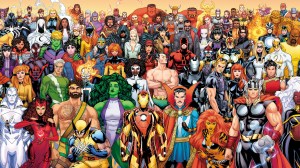Duke Nukem Forever is the classic cautionary tale of what can happen to a game and an entire beloved franchise if the development cycle gets out of hand. Teased in an E3 trailer released in 1998, Duke Nukem Forever would undergo an extended period of development struggle until it was eventually released in 2011. Previously, Duke Nukem Forever held the video game record for the longest time in development hell, taking 14 years to release. That title was usurped in 2022 by Beyond Good & Evil 2, which has yet to come out.
Videos by ComicBook.com
All that development did not do Duke Nukem Forever any favors. The game was widely criticized upon its release and put an effective end to the series that has lasted until this day. Just how did something like this happen with such a celebrated franchise that it released a contender for one of the worst big title releases of all time?
The Legacy of Duke Nukem

Originally released as Duke Nukem in 1991, the series differentiated itself from similar shooters with its raunchy humor, pop culture references, and charismatic titular character. Duke was quickly cemented as one of the most memorable shooting game protagonists of the decade by the time Duke Nukem 3D hit in 1996, and Duke is still considered by retro fans today to be one of the kings of the era.
However, after Duke Nukem 3D, the series struggled to find its identity. While work was being done on Duke Nukem Forever, a series of smaller projects were planned, which included a third-person Tomb Raider-inspired action game, a 2.5D shooter/platformer, a dinosaur-hunting game, and mobile adaptations of Duke Nukem 3D, among others. The projects that saw the light of day found middling success, carried by Duke’s cheesy persona while Duke Nukem 3D fans waited for the next ‘proper’ Duke game to come out.
Duke Nukem Forever Was Killed In Development
However, fans anticipating Duke Nukem Forever were kept waiting in the wings for nearly a decade and a half as developer 3D Realms struggled to bring the concept to life. The development cycle was marred by serious and frequent delays that kept pushing the game further and further away.
Aside from the initial 1998 trailer, there isn’t much to show for the early work done on Duke Nukem Forever. What we know about its early stages comes from a second trailer released at E3 in 2001, as well as purported Duke Nukem Forever leaks from the era that emerged a few years ago.
Development eventually had to be moved to Unreal Engine 2 to ensure the game would stay up-to-date. Duke Nukem Forever game designer George Broussard told Eurogamer in 2010 that moves like these were the primary reasons the game kept getting pushed back, as constantly switching engines would result in already finished content needing to be scrapped and remade. In 2006, Broussard wrote in a forum post quoted by GameSpot that the game would be “done when it’s done,” which has become a sort of infamous refrain about the game online.
By the time Duke Nukem Forever was released, many of its mechanics, graphics, and even pop culture references felt noticeably dated, an entailment of its long development cycle and something that was immensely disappointing to series fans.
Could the Series Ever Be Revived?

While theoretically any series can be revived, lengthy legal battles between the IP holders over the years seem to be what has put the final nail in the coffin for the Duke Nukem series.
Publisher Take-Two eventually sued 3D Realms for breach of contract in 2009 over the continued delay of Duke Nukem Forever, a suit that was jointly dismissed. In the wake of the lawsuit, the following year, Borderlands developer Gearbox purchased the rights to the franchise in a bid to finally release the project. However, the game’s release was disastrous, with publisher 2K saying in its Quarterly earnings report in 2011 that Duke Nukem Forever was only estimated to sell half as many copies as expected. (via GamesIndustry.biz)
Gearbox would eventually file its own breach of contract lawsuit against 3D Realms’ parent company, Apogee Software, in 2020. This lawsuit followed issues of copyright spawned from another lawsuit by composer Bobby Prince, who claimed Gearbox and Valve had improperly denied him royalties for the 2016 Duke Nukem 3D: 20th Anniversary World Tour release on Steam.
More than just legal issues and some bad blood between those involved, there is also the problem of fan distrust for a future title after what happened with Duke Nukem Forever. Some game series just feel cursed after too much disappointment and negativity, and the black mark that popular developer Gearbox took with Duke Nukem Forever means that other companies would be hesitant to take the chance. In 2023, the developer of Duke Nukem 1+2 Remastered had to apologize for using AI key art, and fans were disappointed that it was planned as an Evercade exclusive.
Want to stay up to date on the biggest geek entertainment news? Add us as a preferred source in Google – HERE.









